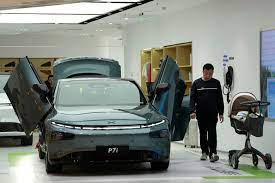LONDON (AP): When Laima Springe-Janssen was looking to replace her French-made gasoline-powered SUV with an electric car, she considered models from Volvo and Nissan.
The Volvo extras she wanted would have busted her budget, while the Nissan lacked the “wow factor.” The Copenhagen, Denmark, resident ended up buying a compact SUV from China’s BYD.
“I really, really love the car,” Springe-Janssen said. For the equivalent of about $50,000, the Atto 3 SUV came with “all these goodies” like a 360-degree dash cam, two years of free charging and an extra set of winter tires.
Her husband likes it so much he’s considering buying another BYD to replace their other car, from Volkswagen’s Skoda brand.
“I’m sorry, Europe. Go home,” she said. “China has a better offer.”
Her enthusiasm underscores how Chinese automakers are winning over drivers as they make major inroads into Europe’s electric vehicle market, challenging long-established homegrown brands in an industry that’s key to the continent’s green energy transition.
The competitive threat has spurred the European Union to launch an investigation into Beijing’s support for its EV industry. That adds to tech-related tensions between the West and China, which is one of Europe’s biggest trading partners and the world’s biggest auto market.
China’s EV onslaught, along with massive U.S. clean energy funding that has drawn investment away from Europe, shows how the 27-nation bloc is caught in the middle of the global race for green technology.
Chinese EV makers are drawn to Europe because auto import tariffs are just 10% versus 27.5% in the U.S., independent auto analyst Matthias Schmidt said. Europe also has the world’s second-biggest EV battery market after China.
Nevermind the geopolitics. Climate-conscious car buyers in Europe who are grappling with an increased cost of living rave about how Chinese EVs are affordable yet packed with features and stylish design. Concerns about the threat to local carmakers and jobs just aren’t a factor for them.
British retiree John Kirkwood replaced his Volkswagen Passat three years ago with an MG5 station wagon because the 30,000-pound ($36,000) price tag “wiped the floor” with its nearest rival — a Kia that cost thousands more.
“It’s nice. It’s quiet, it’s refined” and very quick, Kirkwood said, adding that he had few qualms about British brand MG’s Chinese ownership.
MG — owned by SAIC Motor, China’s biggest automaker — is the largest Chinese EV player in Europe. BYD, backed by billionaire investor Warren Buffett, is growing fast. There’s also Geely, which owns Sweden’s Volvo and a stable of EV brands including Polestar, Lynk & Co. and British sportscar maker Lotus.
Behind them are a slew of startups, like NIO and Xpeng.







